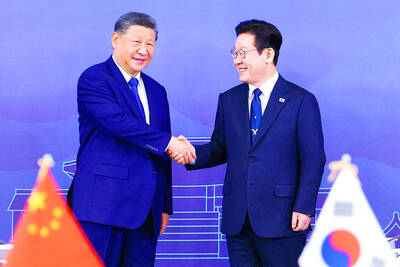The first person convicted under Hong Kong’s National Security Law and jailed for nine years in July last year has dropped his decision to appeal, his lawyer said yesterday.
Former waiter, Tong Ying-kit (唐英杰), 24, was found guilty of terrorist activities and inciting secession after driving his motorcycle into three riot police in 2020 while carrying a flag with the protest slogan “Liberate Hong Kong — revolution of our times.”
The ruling was seen as a watershed moment for Hong Kong’s judicial system. At the time, Tong had indicated through his lawyer, Clive Grossman, that he would appeal.
However, Grossman said in an e-mail that Tong, who had pleaded not guilty, had decided not to appeal.
“I have no idea why he dropped the appeal,” Grossman said.
The decision was first reported by the Hong Kong Free Press, which quoted Grossman as saying that he was surprised by his client’s decision.
At the end of Tong’s closely watched trial, judges Anthea Pang (彭寶琴), Esther Toh (杜麗冰) and Wilson Chan (陳嘉信) — picked by Hong Kong Chief Executive Carrie Lam (林鄭月娥) to hear national security cases — ruled that the slogan he carried on his motorbike was “capable of inciting others to commit secession.”
Late on Wednesday, Hong Kong democracy advocate Owen Chow (鄒家成) was rearrested during his regular visit to a police station.
The 24-year-old had been released on bail in June last year after nearly four months in detention, on the conditions of not breaking the National Security Law, reporting to the police every day and surrendering all travel documents, among others.
Chow was arrested on suspicion of making remarks since his release that could endanger national security, police said, adding that he would be taken to the West Kowloon Magistrates’ Courts.
“The National Security Division of the Police Force arrested the man ... on suspicion of breaching the court’s bail conditions,” police said in an e-mailed statement yesterday.
“He was suspected of making remarks and actions that could reasonably be regarded as endangering national security during the bail period,” it said, without specifying the remarks.
Chow could not be reached for comment.
Chow is among 15 of the 47 democracy advocates released on bail last year after their arrest in March in a high-profile swoop by authorities. The 47 are accused of conspiring to subvert the government by organizing a primary election for the opposition camp in 2020 to select candidates for legislative polls.
The primary poll was unofficial, non-binding and independently organized.
Authorities said it was a “vicious plot” that threatened national security.

‘CHILD PORNOGRAPHY’: The doll on Shein’s Web site measure about 80cm in height, and it was holding a teddy bear in a photo published by a daily newspaper France’s anti-fraud unit on Saturday said it had reported Asian e-commerce giant Shein (希音) for selling what it described as “sex dolls with a childlike appearance.” The French Directorate General for Competition, Consumer Affairs and Fraud Control (DGCCRF) said in a statement that the “description and categorization” of the items on Shein’s Web site “make it difficult to doubt the child pornography nature of the content.” Shortly after the statement, Shein announced that the dolls in question had been withdrawn from its platform and that it had launched an internal inquiry. On its Web site, Le Parisien daily published a

China’s Shenzhou-20 crewed spacecraft has delayed its return mission to Earth after the vessel was possibly hit by tiny bits of space debris, the country’s human spaceflight agency said yesterday, an unusual situation that could disrupt the operation of the country’s space station Tiangong. An impact analysis and risk assessment are underway, the China Manned Space Agency (CMSA) said in a statement, without providing a new schedule for the return mission, which was originally set to land in northern China yesterday. The delay highlights the danger to space travel posed by increasing amounts of debris, such as discarded launch vehicles or vessel

RUBBER STAMP? The latest legislative session was the most productive in the number of bills passed, but critics attributed it to a lack of dissenting voices On their last day at work, Hong Kong’s lawmakers — the first batch chosen under Beijing’s mantra of “patriots administering Hong Kong” — posed for group pictures, celebrating a job well done after four years of opposition-free politics. However, despite their smiles, about one-third of the Legislative Council will not seek another term in next month’s election, with the self-described non-establishment figure Tik Chi-yuen (狄志遠) being among those bowing out. “It used to be that [the legislature] had the benefit of free expression... Now it is more uniform. There are multiple voices, but they are not diverse enough,” Tik said, comparing it

RELATIONS: Cultural spats, such as China’s claims over the origins of kimchi, have soured public opinion in South Korea against Beijing over the past few years Chinese President Xi Jinping (習近平) yesterday met South Korean counterpart Lee Jae-myung, after taking center stage at an Asian summit in the wake of US President Donald Trump’s departure. The talks on the sidelines of the APEC gathering came the final day of Xi’s first trip to South Korea in more than a decade, and a day after his meeting with the Canadian prime minister that was a reset of the nations’ damaged ties. Trump had flown to South Korea for the summit, but promptly jetted home on Thursday after sealing a trade war pause with Xi, with the two